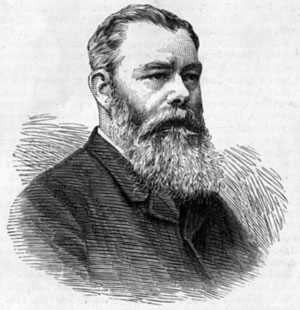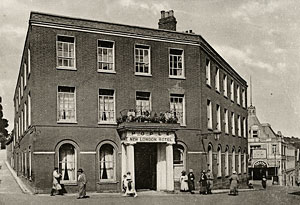
Robert Pople - three times Mayor
Page added 16 December 2008
Return to Exeter People Menu
In January 1865, it was announced that William Routley, the keeper of the Half Moon Hotel in the High Street, was to retire from the business, and that Robert Pople from Somerset, would succeed him. Pople, would become one of the city's most popular Mayor's, and be praised for his action during the Theatre Royal fire of 1887.
Robert Pople was a native of Bridgewater - born in 1836, his father John Pople, from North Petherton, was a brickmaker for John Sealy and Co., one of several brickyard's in Dunswear, south Bridgewater. Brickmaking could be a precarious profession, with long periods of unemployment. Whether this, or increasing age was why John Pople became an innkeeper, is unclear, but he was listed as running the New Inn, Eastover in the 1851 census. The fifteen year old Robert was recorded as a brickmaker, a profession that he would not follow for long. By 1861, it was Robert Pople who was listed running the Eastover Commercial Hotel; perhaps his father died and the young Robert took over. Whatever the truth, he was already married to Sarah and had a one year old daughter Annie; a second daughter, Kate, would follow in 1866. Thus, Robert Pople had gained valuable experience in running a hotel by the time he arrived in Exeter to take on the Half Moon Hotel.
It was not long before the new arrival started to permeate Exeter society. In January 1868, Robert Pople was a member of the Masonic Lodge of St John the Baptist when 'Brother Pople of the Half Moon supplied a banquet of the most recherché character.' The next year he was listed as having subscribed £2 2s to the fund for the building of the Albert Memorial Museum.
Pople's New London Hotel
It was in January 1869 that Robert Pople left the Half Moon to become the fifth landlord of the New London Inn, a hotel with which, he would be forever associated. The New London Inn was opened in 1794 by John Land, to quickly become one of the most fashionable and largest hotels in Exeter. It was the terminus for the London stagecoach, and in 1850 could cater for 300 horses per day. The famous Quicksilver coaching service to London took 17 to 18 hours, when the railway arrived in Exeter during 1844. The rich and the famous stayed and during Pople's tenure, Robert Louis Stevenson, Beatrix Potter and royalty, among others, stayed or called at the hotel.
Politics and skulduggery
Robert Pople became involved in local politics as a Conservative, when in 1869 he stood for St David's Ward, along with fellow Tory, Edward Knapman, and they were both returned. However, Robert Pople was not above a little election skulduggery when "A witness named Robert Pople deposed to having received £40 from John Murlis, and bribed four voters with £10. each." (Daily News) At the Election Commission enquiry at Bridgewater, he admitted bribing voters, but was allowed to keep his seat as a councillor, probably because it would not have made any difference to the result. He represented St David's Ward until 1881 when he retired from the council. Pople's New London Hotel, as it became known, was the centre of Conservative life in the city, where meetings, election celebrations, and political plotting took place.
To add to his political work, Robert Pople was 'a great racegoer and a strong churchman' and was an enthusiastic supporter of the Haldon Races. He came second, showing a pony at the Royal Agricultural Show in Taunton during 1875, having already attended the Devon Agricultural Socity with the same animal. Robert Pople is listed in some directories as running the New London Hotel and as a farmer. In 1891 he advertised for a farm labourer 'to milk cows and attend pigs' and, no doubt, he would have needed land outside of the city for his horses. A natural sideline for a proprietor of a coaching hotel was the supply of carriages for hire, and many were supplied by Robert Pople for funerals.
The Theatre Royal Fire
On a Monday evening in September 1887, a gas light in the scenery of the Theatre Royal, set fire to some fabric and quickly spread. Within a few seconds the scenery blew out over the audience and panic set in. The alarm was raised, and Robert Pople quickly responded to the emergency by supplying half a dozen ladders to the West of England Fire Brigade, and helped people to escape the flames. Pople made the New London Inn available for the distressed victims who had escaped the inferno, and opened the stables for the dead to be laid out. He was praised in the London Illustrated News for his efforts earning a place in the hearts of many in the city. The next month the Belfast News reported 'The Earl of Portsmouth yesterday, at Exeter, presented a silver and gold bracelet to Mr. and Mrs. Robert Pople, of Exeter, who, on the night of the destruction of the Exeter Theatre, placed their servants, their house, and everything in it at the disposal of the rescue party for the reception of the injured.' See Theatre Royal fire. When the new Theatre Royal opened in October 1899, it was expected to be the first in Exeter to be lit by electricity; the power station further down New North Road was not ready for service, so Robert Pople allowed the electricity company to install a portable steam driven generator in his yard for the opening few days of the new theatre.
Robert Pople returned to public life in 1891 when he was appointed Sheriff of the City. Then in 1894, he was elected an Alderman and in November 1895 he became Mayor, replacing Mr. A B Perkins. He was a popular Mayor and was re-elected for the two following years, serving three years in succession. He concerned himself with improving the city and stated "there were many sought to live in Exeter if only they could find suitable houses at a rent of between £60 and £120. There were, indeed, many premises to let in the city but were devoid of modern conveniences and advantages or arrangements of modern houses." (Flying Post 1897) Exeter's first Cart Horse Parade on Whit Monday 1896, was initiated by Robert Pople in his first term as Mayor. It was an event that came to be regularly held in the city until the 1930's.
He remained an Alderman after his last year as Mayor, but after the ascendancy of the Liberals to the council in 1900, he stood down in 1903. He took an active part, after the Boer War to support the returning soldiers, but this was the last of his public service.
Sarah died in August 1907, an event from which Robert Pople never recovered, and after several months of ill health, he died in 1909 and was buried in Higher Cemetery.
Sources - Flying Post, census, trade directories, Victorian Exeter by Robert Newton.
 Robert
Pople in 1887.
Robert
Pople in 1887.
 Pople's New London Hotel - the Theatre
Royal is to the rear, right.
Pople's New London Hotel - the Theatre
Royal is to the rear, right.
│ Top of Page │